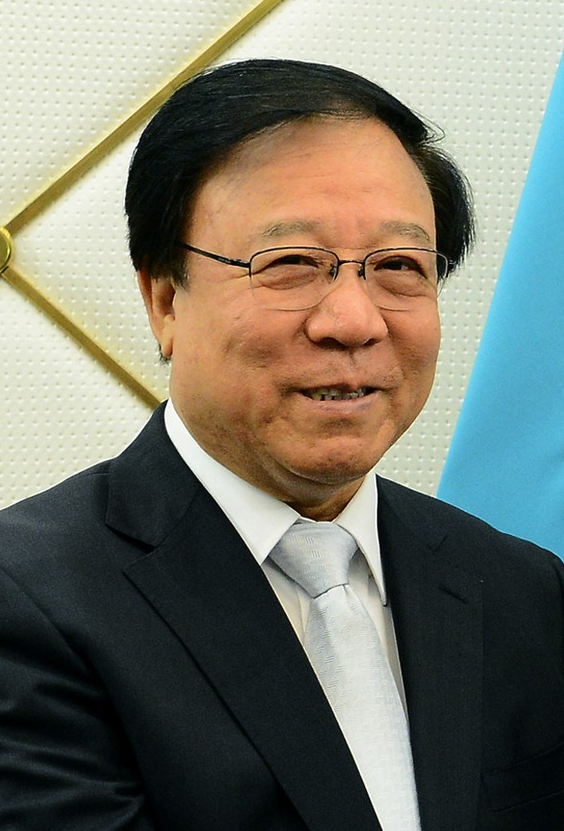1. Overview
Lu Hao (陆浩Lù HàoChinese) is a prominent Chinese politician born in April 1947. Throughout his extensive career, he has held significant leadership positions at both provincial and national levels within the Chinese Communist Party and the government of the People's Republic of China. His career progression includes serving as the Governor of Gansu Province, followed by his tenure as the Party Secretary of Gansu, the top political office in the province. He also chaired the Gansu Provincial People's Congress. Later, he transitioned to national politics, becoming a member of the Standing Committee of the National People's Congress and leading its Environmental Protection and Resources Conservation Committee.

2. Early Life and Education
Lu Hao's formative years and academic background laid the foundation for his later political career.
2.1. Birthplace and Background
Lu Hao was born in April 1947 in Changli County, which is located in Hebei Province, China.
2.2. Education
His academic journey included studies at two significant Chinese universities. He pursued higher education at both Lanzhou University and Dalian University of Technology, equipping him with a strong educational background before entering public service.
3. Political Career
Lu Hao's political career spans several decades, marked by a series of high-profile appointments in both provincial and national governmental and party structures.
3.1. Early Provincial Roles
Before assuming the top leadership roles in Gansu, Lu Hao held several key positions that contributed to his administrative experience within the provincial party apparatus.
3.1.1. Head of the Organization Department of Gansu Provincial Committee
From 1993 to 1996, Lu Hao served as the Head of the Organization Department of the Gansu Provincial Committee of the Chinese Communist Party. In this capacity, he was responsible for personnel management, cadre selection, and party building within the province. He succeeded Yang Zhenjie in this role and was later succeeded by Yang Limin.
3.1.2. Party Secretary of Lanzhou
Following his tenure in the Organization Department, Lu Hao became the Party Secretary of Lanzhou, the capital city of Gansu Province, serving from 1996 to 1999. As the Party Secretary, he held the highest political authority in the city, overseeing its development and governance. He succeeded Li Hulin and was succeeded by Zhang Qingli.
3.2. Governor of Gansu
Lu Hao served as the Governor of Gansu Province from January 2001 to October 2006. As the chief executive of the provincial government, he was responsible for the province's economic development, social welfare, and public administration. During his term, he played a crucial role in implementing provincial policies and managing day-to-day government affairs. He succeeded Song Zhaosu and was succeeded by Xu Shousheng.
3.3. Party Secretary of Gansu
In April 2007, Lu Hao was appointed as the Party Secretary of Gansu, the highest political office in the province. He held this influential position until December 2011. As Party Secretary, he was the ultimate authority in the provincial Chinese Communist Party committee, guiding the province's overall strategic direction, party affairs, and major policy decisions. He succeeded Su Rong and was succeeded by Wang Sanyun. On January 26, 2008, he was re-elected to this position during the 11th Gansu Provincial People's Congress.
3.4. Chairperson of the Gansu Provincial People's Congress
Concurrent with his role as Party Secretary, Lu Hao also served as the Chairperson of the Gansu Provincial People's Congress from January 2007 to December 2011. In this capacity, he led the provincial legislature, overseeing the enactment of local laws and regulations, and supervising the provincial government's work. This dual role underscored his significant influence over both party and legislative affairs within Gansu Province. He succeeded Su Rong and was succeeded by Wang Sanyun.
3.5. National-Level Roles
After stepping down from his provincial leadership roles in 2011, Lu Hao transitioned to national-level political engagement, taking on responsibilities within the central legislative body.
3.5.1. Member of the Standing Committee of the National People's Congress
Upon his retirement from active provincial politics in December 2011, at the age of 64, Lu Hao became a member of the Standing Committee of the National People's Congress. This role marked his continued involvement in national governance, contributing to the legislative process at the highest level of the state.
3.5.2. Chairperson of the Environmental Protection and Resources Conservation Committee
From March 2013 to March 2018, Lu Hao served as the Chairperson of the Environmental Protection and Resources Conservation Committee of the National People's Congress. In this leadership role, he was instrumental in guiding legislative efforts related to environmental protection, resource management, and sustainable development policies for the entire nation. He succeeded Wang Guangtao and was succeeded by Gao Hucheng.
3.5.3. Vice-Chairperson of the Foreign Affairs Committee
In addition to his other national roles, Lu Hao also served as the Vice-Chairperson of the Foreign Affairs Committee of the 11th National People's Congress Standing Committee. This position involved advising on and overseeing matters related to China's foreign policy and international relations.